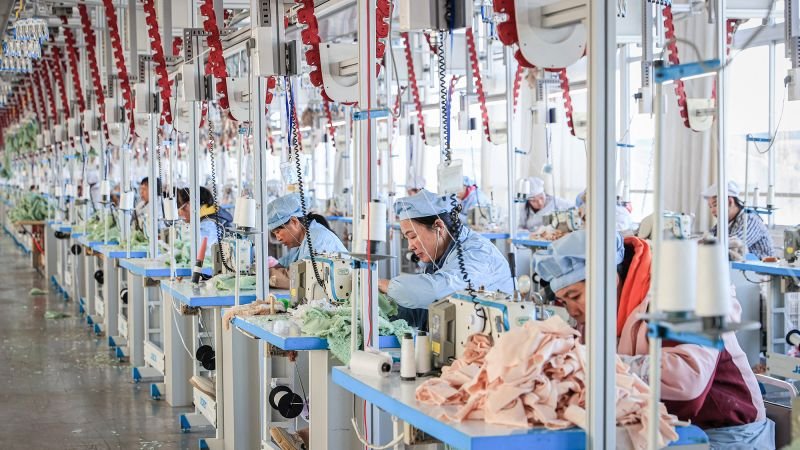Physical Address
304 North Cardinal St.
Dorchester Center, MA 02124
Physical Address
304 North Cardinal St.
Dorchester Center, MA 02124

Beijing
Reuters
—
China’s industrial production growth accelerated slightly in November, while retail sales disappointed, keeping alive calls for Beijing to step up consumer-targeted stimulus as policymakers push for more U.S. trade tariffs under a second Trump administration.
The mixed data underscores how difficult it will be for China’s leaders to orchestrate a sustained economic recovery through 2025, with trade ties with China’s biggest export market likely to deteriorate while domestic consumption is also weak.
US President-elect Donald Trump’s vow to impose tariffs of more than 60% on Chinese goods could prompt Beijing to speed up plans to overhaul its $19 trillion economy, analysts said. This comes after more than two decades of deliberation to shift from the current growth model based on fixed asset investment and exports to a consumption-based model.
China’s November industrial production rose 5.4 percent from a year earlier, faster than the 5.3 percent pace seen in October, National Bureau of Statistics (NBS) data showed on Monday, beating forecasts for a 5.3 percent increase in a Reuters poll.
However, retail sales, a gauge of consumption, grew at their weakest pace in three months last month, at 3.0%, much slower than the 4.8% increase seen in October. Analysts had expected an expansion of 4.6%.
“China’s economic policies have been consistent in promoting manufacturers over consumers, despite clear signs of persistent weakness,” said Dan Wang, an independent economist in Shanghai. “Therefore, production capacity can be expected to strengthen, causing the problem of overcapacity and motivating Chinese companies to seek overseas markets.”
Fixed asset investment also grew at a slower pace of 3.3% in January-November compared to the same period a year earlier, compared to an expected increase of 3.4%. Between January and October it grew by 3.4%.
“Worries about poor retail sales may be overblown, as the start of the ‘Double 11’ shopping festival has been inferred since the beginning of the year, pushing sales up until October,” said Xu Tianchen, senior economist at the Economist Intelligence Unit.
“If we smooth out the October-November data, growth should average around 3.9%, higher than in the previous months,” he added. “But consumer demand is not strong per se, it is still very dependent on government subsidies, which contributed about 1.5-2 percentage points to retail sales every month.”
China’s blue chip index was down 0.37% in early afternoon and Hong Kong’s Hang Seng index was down 0.57%.
Policymakers have begun to outline their plans for 2025 in recent weeks, saying Trump’s return to the White House will put a lot of strain on an already weak economy.
Over the weekend, an official at China’s central bank said there was scope for further reductions in the amount of money banks must hold as reserves, but credit numbers released last week showed that past easing had done little to boost lending.
That’s partly because policymakers have yet to find a solution to the years-long property crisis that is denting consumer confidence, with around 70% of household savings parked in real estate.
And while there were some encouraging signs in China’s new home prices, which fell at their slowest pace in 17 months in November, it is too early to call a recovery, analysts said.
Stabilizing the real estate sector, which at its peak made up 25 percent of the economy, will be key if Beijing is to maintain its growth target of around 5 percent next year, Reuters reported, as policy advisers have recommended.
A recent poll by Reuters predicted that China will grow by 4.5% next year, and the new US tariffs will reduce it to 1 percentage point.
On Monday, Moody’s Ratings raised its forecast for China’s GDP growth to 4.2% by 2025 from 4%.
At last week’s closely watched agenda-setting Central Economic Work Conference (CEWC), China’s top leaders made raising the budget deficit, issuing more debt and boosting consumption a top priority.
The remarks echoed pledges earlier this month by the Communist Party’s top leadership, the Politburo, which adopted a “suitably loose” monetary policy in the first easing of its stance in 14 years.
“We think the contraction in November is likely to be temporary, and growth is likely to pick up again in the coming months as policy support continues to increase,” said Julian Evans-Pritchard, head of China economics at Capital Economics.
“But we doubt the stimulus can provide anything more than a short-lived improvement, especially since the current strength in export demand is unlikely to last once President Trump starts to follow through on some of his tariff threats.”